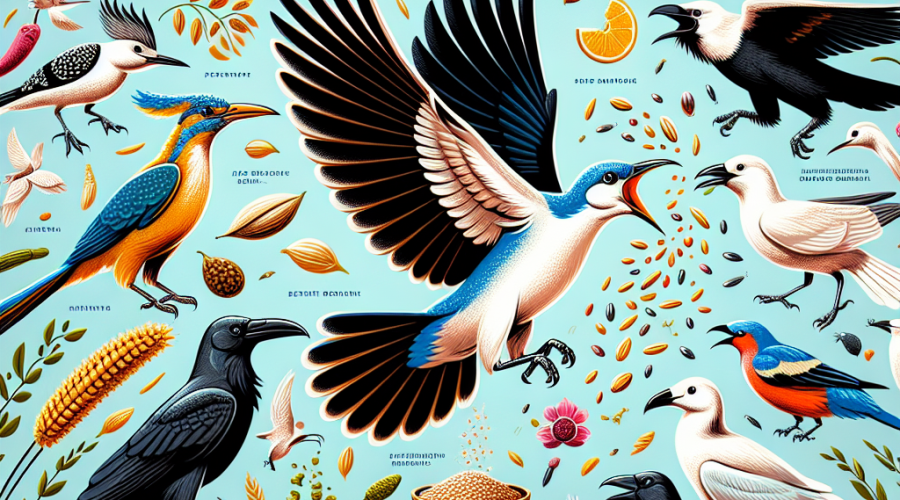Feeding Your Feathered Friends: A Comprehensive Guide to Bird Nutrition
Birds are such a delight to have around, aren’t they? Their chirping melodies can bring a sense of peace and tranquillity to even the most chaotic of days. But when it comes to feeding these feathered friends of ours, things can get a little tricky. We all want to ensure they’re getting the right nutrition, but how do we know what that is? Fear not, dear reader, for we’re about to embark on a comprehensive journey into the world of bird nutrition together!
The Basics of Bird Nutrition
Just like you and me, birds need a balanced diet to stay healthy. But what does a balanced diet for a bird look like? Let’s break it down: Protein, carbohydrates, fats, vitamins, and minerals – these are the key components. But it’s not just about the what, it’s about the how much as well. The proportion of these nutrients can vary significantly depending on the species, age, and lifestyle of the bird.
For instance, did you know that parrots need a diet rich in Vitamin A, while canaries thrive on a high-protein diet? Fascinating, isn’t it? This is why it’s crucial for us to understand the dietary needs of different bird species. It’s a little like being a birdie nutritionist!
Fat, Protein and Carbohydrates
Birds, being the high-energy creatures they are, need a diet rich in fats and protein. Fats are their main source of energy, while protein is vital for growth and repair. A healthy bird diet should consist of approximately 15-30% protein and 30-70% fat.
Carbohydrates, on the other hand, are not as necessary. Birds don’t have a specific requirement for carbs, as they can get their energy from fats. However, some carbs won’t harm. Grains, vegetables, and fruits can provide this along with essential minerals and vitamins.
Vitamins and Minerals: The Unsung Heroes
While fats and protein often steal the limelight, vitamins and minerals are equally important in a bird’s diet. They are vital for various bodily functions, like bone formation, vision, blood clotting, and even reproduction.
Vitamin A, for example, is essential for a bird’s immune system, while calcium is needed for strong bones and egg formation. Birds also need trace minerals like iron, zinc, and selenium. Just remember, too much of a good thing isn’t always good. Over-supplementation can lead to health problems, so it’s all about finding the right balance.
Commercial Bird Feed vs Homemade Meals
Now, you might be wondering, should I buy commercial bird feed or prepare meals at home? Commercial bird feed is often balanced and enriched with the necessary nutrients. But like with human food, not all bird feeds are created equal. Some contain fillers like corn and soy, which don’t offer much nutritional value.
On the other hand, preparing meals at home allows you to control the ingredients. You can tailor the diet to suit your bird’s specific needs. However, it can be time-consuming and requires a good understanding of bird nutrition.
In the end, a combination of both might be the best approach. A high-quality bird feed can form the base of the diet, supplemented with fresh fruits, vegetables, and occasional treats.
Feeding your feathered friends shouldn’t feel like a chore or a puzzle. With a little knowledge and understanding, you can ensure they get the nourishment they need to sing, fly, and bring joy to our lives. Remember, a healthy bird is a happy bird!
FAQs
Q: What nutritional requirements do birds have?
A: Birds require a balanced diet of proteins, carbohydrates, fats, vitamins, and minerals for optimal health. The exact ratio of these nutrients varies depending on the species of the bird.
Q: How often should I feed my bird?
A: Typically, birds should have a constant supply of suitable food available to them. However, fresh foods such as fruits or vegetables should be offered daily and removed after a few hours to prevent spoiling.
Q: Can I feed my bird human food?
A: While some human foods are safe for birds, many are not. It is essential to research each food type before offering it to your bird, to ensure it is safe and nutritious.
Q: What are the benefits of feeding birds pellets over seeds?
A: Pellets are often nutritionally superior to seed-only diets as they are formulated to provide a balanced diet. Seeds, whilst high in fat, lack other necessary nutrients and can lead to nutritional deficiencies if not supplemented correctly.
Q: Is it necessary to provide birds with supplements?
A: While a well-balanced diet should provide all necessary nutrients, some birds may require extra supplementation. For example, birds that are breeding, molting, or recovering from an illness may benefit from additional vitamins or minerals. Always consult with a vet before starting any supplement regimen.

